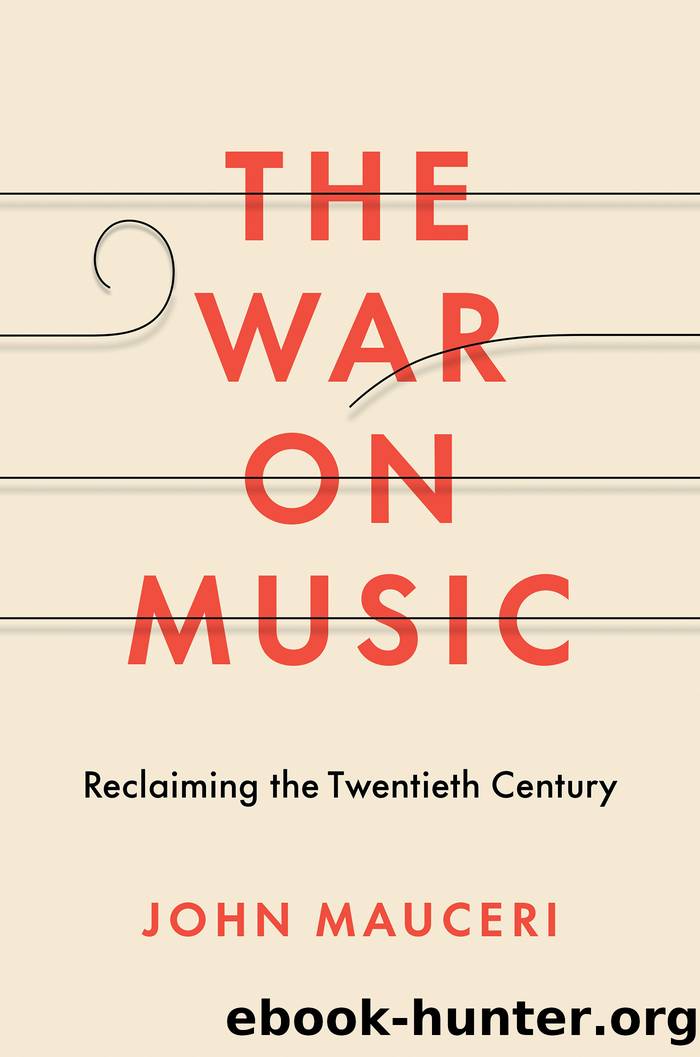The War on Music by John Mauceri

Author:John Mauceri [Mauceri, John]
Language: eng
Format: epub
ISBN: 9780300265477
Publisher: YaleUP
Published: 2022-09-15T05:00:00+00:00
A SOLUTION EMERGES: THE RETURN OF THE AVANT-GARDE
Avant-garde is a military term. It refers to a group of highly trained soldiers who advance ahead of the others (the main-guard and the rearguard) to seek out the enemy. But if you look up the word avant-garde in terms of art, you will find yourself in a forest of definitions, some of which directly contradict each other.
At its start in the early 1900s, the avant-garde movement that became codified and published as a call to action in Marinettiâs Futurist Manifesto of 1909 seems to have been fueled by a hatred of capitalism and mass markets. As a result, instead of rejoicing in the influence the movement was having on other artists and the public (the main-guard and the rearguard), the avant-garde artist was meant to reject influence altogetherâas if such a thing were possible. In addition, the movement defined any art that it might have influenced as being derivative and therefore fake or kitsch.
The avant-garde also emerged out of a concept of futurismâin which new is better than oldâand a general opposition to mainstream concepts of art and music was central to its beliefs. Thus, once the avant-gardeâs external manifestationâits voice, as it wereâwas accepted, it was either abandoned or denigrated as no longer being truthful. In its hermetically sealed definition, it could only exist as a group of leaders of a club that no one can join because it no longer exists. Of course, the circular logic of this philosophy is exposed when one attempts to define newness and oldness.
The word obscene comes from the Latin obscena, meaning offstage. The holy altar of the theater, as determined by the Greeks and Romans, would never permit certain actions to be seen by an audience. To solve the dilemma of telling stories that involved objectionable acts, the Greeks had invented the role of the âMessengerââthe actor who reports that the queen has hanged herself, and so forth. The audience was required to imagine these things but never actually see them.
The avant-garde in art likes to tweak societyâs ideas of what is art, as well as what is objectionable. In 2014, for example, a sale of four paintings made from pigeon droppings on white canvas (created by the artist Dan Colen) sold for $545,000 in New York City. In 2017, advertisements promoting a retrospective of erotically explicit images by the expressionist painter Egon Schiele (1890â1918) were banned from appearing on the sides of buses in Vienna and London.
With the embrace of the preâWorld War I avant-garde within the artistic communities of western Europe and America in the 1960s, composers took its founding principles to their logical, and some might say absurd, conclusions. You could spend hours imagining new musical works that achieved most of what you read in the above paragraphs. Then, following this logic, you could decide it might be more appropriate to write a book about these works without ever actually composing or performing them. Then, once this book of recipes was
Download
This site does not store any files on its server. We only index and link to content provided by other sites. Please contact the content providers to delete copyright contents if any and email us, we'll remove relevant links or contents immediately.
The Secret History by Donna Tartt(19092)
The Social Justice Warrior Handbook by Lisa De Pasquale(12190)
Thirteen Reasons Why by Jay Asher(8912)
This Is How You Lose Her by Junot Diaz(6889)
Weapons of Math Destruction by Cathy O'Neil(6281)
Zero to One by Peter Thiel(5802)
Beartown by Fredrik Backman(5756)
The Myth of the Strong Leader by Archie Brown(5509)
The Fire Next Time by James Baldwin(5447)
How Democracies Die by Steven Levitsky & Daniel Ziblatt(5219)
Promise Me, Dad by Joe Biden(5154)
Stone's Rules by Roger Stone(5088)
A Higher Loyalty: Truth, Lies, and Leadership by James Comey(4964)
100 Deadly Skills by Clint Emerson(4926)
Rise and Kill First by Ronen Bergman(4790)
Secrecy World by Jake Bernstein(4753)
The David Icke Guide to the Global Conspiracy (and how to end it) by David Icke(4720)
The Farm by Tom Rob Smith(4514)
The Doomsday Machine by Daniel Ellsberg(4490)
